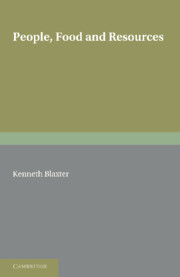2 - THE NUMBERS OF PEOPLE
Published online by Cambridge University Press: 06 July 2010
Summary
MALTHUS
Any discussion about the growth of the population of the world must begin with Thomas Robert Malthus. It was the rejection of a then current view about the future that prompted Malthus to write his famous essay which he published anonymously in 1798. His purpose was to refute what he regarded as an unwarranted idealism about the perfectibility of human society, an idealism that probably had its roots in the revolution in France. The title of the essay indeed reflects this underlying purpose and is: An Essay on the Principle of Population as it affects the Future Improvement of Society, with Remarks on the Speculations of Mr Goodwin, M. Condorcet and Other Writers.
In the essay Malthus attempted to explain the apparent stability or, at the most, the slow growth of human populations and used the ‘principle’ he formulated as the basis of a critique of the idealistic hypotheses. Malthus had been a student at Jesus College, Cambridge, where he had studied mathematics and he presented his principle in these terms. He began by stating his postulates: ‘first that food is necessary to the existence of man and secondly that the passion between the sexes is necessary and will remain nearly in its present state’. He then stated: ‘Assuming these postulates as granted, I say that the power of population is indefinitely greater than the power of earth to produce subsistence for man.
- Type
- Chapter
- Information
- People, Food and Resources , pp. 4 - 29Publisher: Cambridge University PressPrint publication year: 1986



